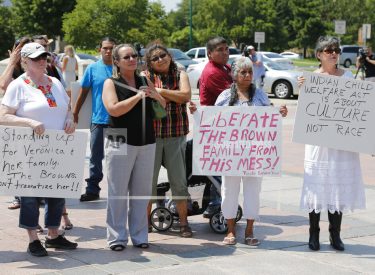States seek safeguards for tribal child welfare
The Associated Press - February 8, 2023 8:24 am

FILE - Participants listen during a rally in support of three-year-old baby Veronica, Veronica's biological father, Dusten Brown, and the Indian Child Welfare Act, in Oklahoma City, Monday, Aug. 19, 2013. Brown is trying to maintain custody of the girl who was given up for adoption by her birth mother to Matt and Melanie Capobianco of South Carolina. The U.S. Supreme Court will hear arguments, Wednesday, Nov. 9, 2022 on the most significant challenge to the Indian Child Welfare Act that gives preference to Native American families in foster care and adoption proceedings of Native American children since it passed in 1978. (AP Photo/Sue Ogrocki, File)
(AP) — A handful of U.S. states are considering legislation this year to include provisions of the Indian Child Welfare Act in state law as the U.S. Supreme Court considers whether the federal law is constitutional. At least 10 states, including Oklahoma, have already done so.
The act requires states to notify Native American tribes when children who are enrolled or could be enrolled in a federally recognized tribe are removed from their families due to allegations of abuse or neglect; to seek placement with the child’s extended family, members of the child’s tribe, or other Native American families whenever possible; and to provide services to help the family move toward reunification.
The efforts in Montana, Wyoming, Utah, and North Dakota come as the Supreme Court weighs challenges to the 1978 law, which was enacted in response to an alarming rate of Native American and Alaska Native children being removed from their homes by public and private agencies.
The justices heard arguments in November and appear likely to leave most of the law in place. The Indian Child Welfare Act, known as ICWA, includes a severability clause, which means parts of it can be struck down while keeping the rest intact.
A measure in South Dakota was voted down this week.
The high court isn’t expected to rule until this summer.
At least 10 states, including Oklahoma, have incorporated aspects of the federal Indian Child Welfare Act into their own laws, according to Turtle Talk, a blog that covers legal issues affecting tribal communities.
Whether these laws will stand depends on what the court decides, particularly if the decision centers on a racial versus a political classification for Native American tribes.
“The states can only treat Indians as a political classification to the extent that the feds can,” said Dan Lewerenz, assistant law professor at the University of North Dakota who is a member of the Iowa Tribe of Kansas and Nebraska.
The Indian Child Welfare Act has long been championed by tribal leaders as a means to preserving their families, traditions, and cultures. The law requires states to notify tribes in certain foster care and adoption proceedings involving Native American children who are or could be enrolled in any of the 574 federally recognized tribes.
Placement preference is given to the child’s extended family, members of the child’s tribe, or other Native American families, but it doesn’t prevent placement with non-Native families.
The lead plaintiffs in the lawsuit challenging the federal law are Chad and Jennifer Brackeen, a Texas couple who have adopted a Native American boy and are seeking to adopt his sibling — a proceeding that’s happening outside the U.S. Supreme Court case.
The Brackeens and other plaintiffs contend the Indian Child Welfare Act is race-based, doesn’t consider the best interests of children, and unlawfully imposes duties on states.
Native American tribes are politically sovereign nations, meaning they govern themselves. A vast majority of federally recognized tribes asked the Supreme Court to uphold the law. They fear widespread impacts to other federal laws that pertain to health care for Native Americans, tribal gambling operations, and public education for Native students if the justices dismantle tribes’ political relationship with the U.S. government.



